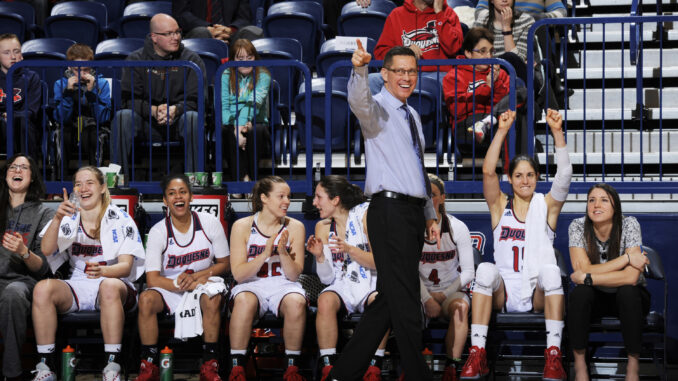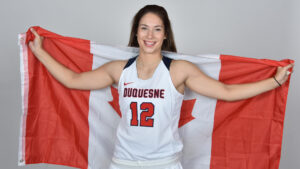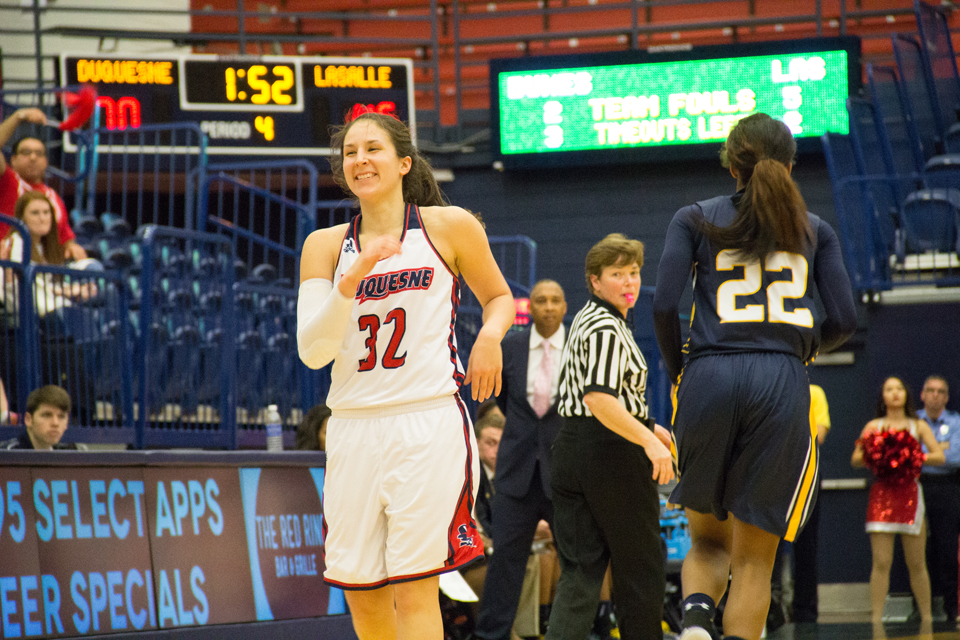

Adam Lindner | Sports Editor
Sept. 24, 2020
On March 6 — a mere five days before the NBA suspended its season in response to the outbreak of COVID-19, becoming the first major professional sports league in America to do so — the Duquesne women’s basketball team fell to third-seeded Fordham in the Atlantic 10 quarterfinals, ending its hopes of a conference title.
Head Coach Dan Burt insists, however, that the team’s season would have continued had it not been derailed thanks to the novel coronavirus.
“Our season was complete from a regular season standpoint, but we fully expected to be playing in the postseason in the NIT,” Burt told The Duke in early September. “We knew we would not be selected to the NCAA Tournament, but we did have a strong indication that we would play in the postseason in the NIT.”
It wasn’t long after the virus’ outbreak, however, that the Dukes realized their season — NIT hopes and all — was definitively over.
Burt explained that the team remained in a “ready state for about three weeks,” but began to understand the gravity of the situation as more information became available.
Interestingly enough, it was one of Burt’s own players that helped to clue him into the situation at hand. Anie-Pier Samson, a 6-foot-2 guard, just so happens to be a biomedical engineering major with a special interest in microbiology and viruses.
“We’ve got a very smart group of players — I believe last year we had eight health science majors at that point,” Burt recalled. “One in particular, Anie-Pier Samson — we call her AP — AP is exceptionally bright.”
He said that she played a major role in giving the team “a vibe and an understanding of what this was, and how serious it was.”
Samson, who’s now a redshirt senior for the Dukes, explained that she had an extensive background in viral particles prior to the advent of COVID-19. Using a biomedical imaging modality called photoacoustic imaging, Samson’s goal in her research as of late is to “detect … the amount of viral particles that are in” a sample of solution, like blood — or, in the case of the novel coronavirus — spit.
“It’s kind of elementary when you put it that way,” Samson admitted. “It’s using this big machine to detect those invisible-to-the-naked-eye particles, which also make a lot of damage for an immunocompromised person right now.
“We need fast and efficient research on it,” Samson continued. “I’m just lucky to be able to be a part of it.”
Burt, entering his eighth season at the helm of the Duquesne program, said that even aside from the pandemic, it’s been an unprecedented time for his team.
“As society has dramatically changed over the last five or six months … there are bigger things than basketball to our players and our program,” Burt said. “Social justice is very important; defeating this virus is very important to our kids. We had a little bit of a bigger picture and a bigger outlook than what you would typically find in a Division I team.”
Regarding social justice, Burt said the team has moved beyond PR-type statements, and is instead focused on taking concrete action and educating itself.
“We’re a program that believes in diversity and inclusion, and we live that,” Burt said. “What we’ve done going forward, since really the George Floyd incident, is we’ve gone beyond statements.
“To be engaged in voter registration, to educating ourselves about who we are voting for — not only at the presidential level, but in local elections. It’s speaking out about our experiences — it’s speaking out to our fellow teammates so that everyone understands what someone of color may be going through.”
Burt admitted, however, the psychological toll that coincides with such uncertain times — especially in relation to young people.
“Managing mental health is an issue in normal times, and we are certainly not in normal times right now,” Burt said. “You definitely have to have a lot more check-in, and you have to watch for any signs of any issues.
“It’s real simple: They can’t just be basketball players. They have to be your family. And that’s the way we treat our women.”
Relevantly, only days ago, the NCAA Division I Council approved a Nov. 25 start date for the 2020-21 basketball season, weeks removed from the original start date, which was set for Nov. 6.
Burt said, on Sept. 8, that “if we do have a change in our start date, that’s going to require hundreds of phone calls and communications regarding scheduling. … Scheduling is, next to recruiting, the hardest thing we do.”
Nevertheless, after such a prolonged and uncertain offseason, it’s likely Burt & Co. are just excited to refocus their sights on basketball — for the most part.



